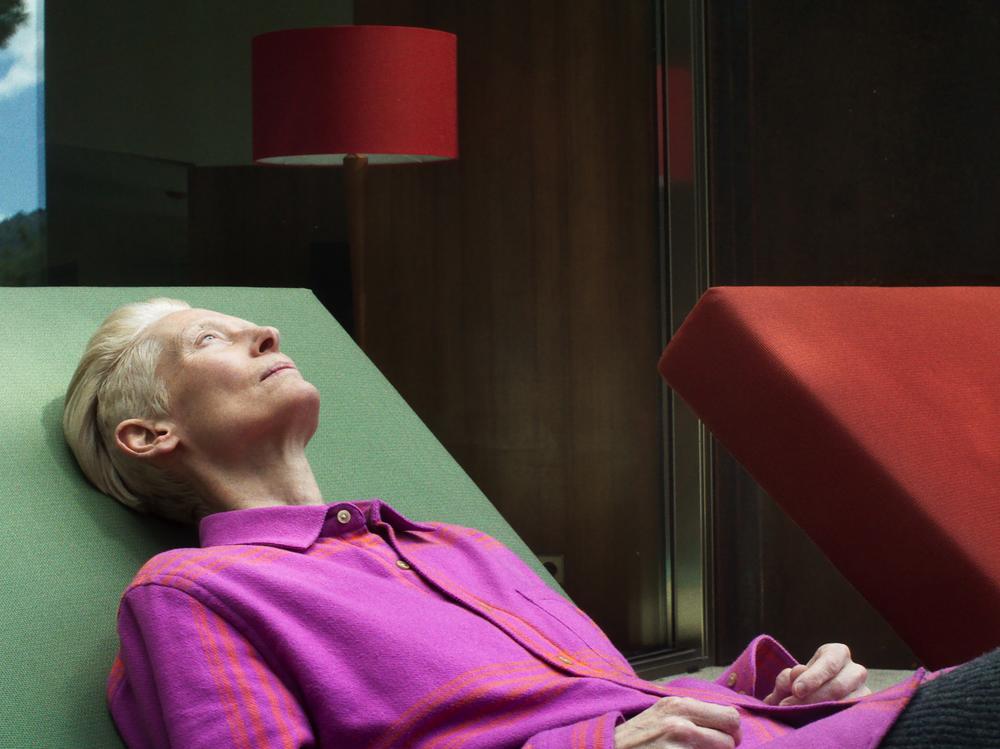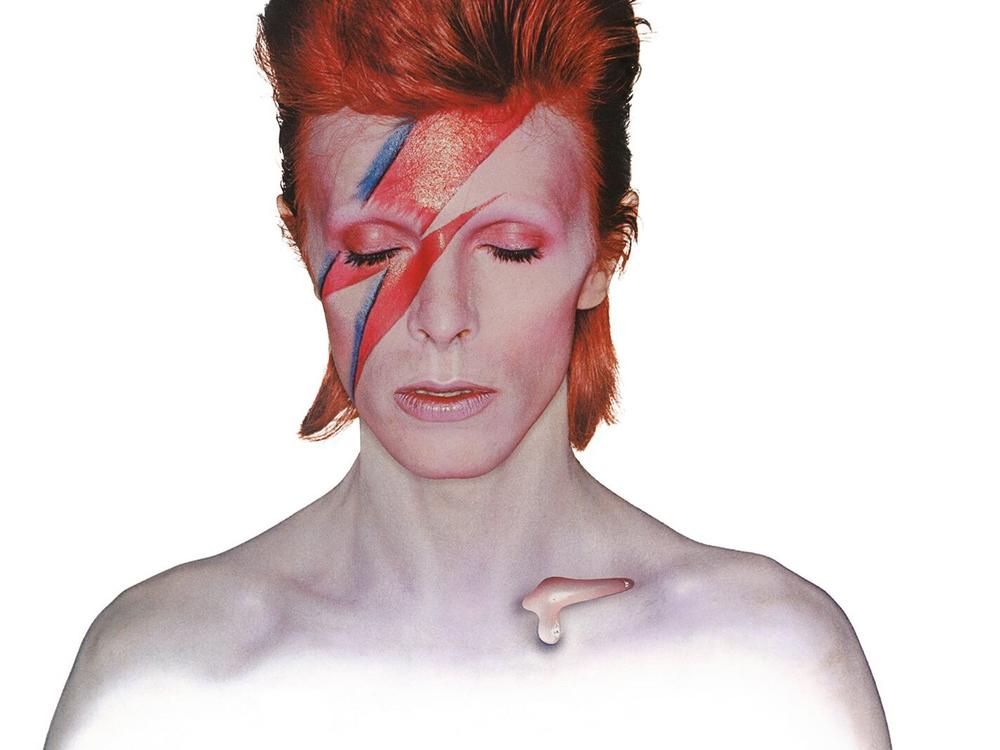Section Branding
Header Content
Tilda Swinton thinks about death and says you should, too
Primary Content
Oscar-winning actor Tilda Swinton is not afraid of the end of life. It's a stance informed, in part, by caring for her mother and sitting bedside when she died in 2012.
"She just sort of fell asleep and slept for several days, and then at the very last minute opened her eyes, and looked at me, and took a last breath, and went," Swinton says of her mother. "I still wonder … did she see something?"
Death is at the center of Swinton's latest film, The Room Next Door, directed by Pedro Almodóvar. Swinton's character, Martha, is a war correspondent with incurable cancer, who has decided to end her own life. She rents a beautiful home in the woods for one month, planning on dying before the month is up, and invites an old friend, played by Julianne Moore, to accompany her.
"When Pedro showed me the screenplay, I was so grateful to him, not only because it reflects so many conversations that he and I have had over the time that we've been friends, but also very much my experience of the last 15 years supporting and bearing witness to loved ones who've been dismounting — as I like to think of it," Swinton says. "He's so determined, always, not to look away. And that's absolutely what this film is about."
Swinton acknowledges that The Room Next Door is about suffering and dying, but she says it's also about living. "It's about someone who's made the decision to live right up to the wire ... who sets her cap at investing her last months, her last weeks in the three things that I've always thought were the things that will always see us through: friendship, art and nature."
At one point in the film, Martha says, "I think I deserve a good death." Swinton says that sentiment should apply to all of us.
"A life spent considering how we're going to spend our end is not wasted time," she says. "We're all going that way, and the sooner we accept and embrace that, then the ice melts and we're kind of informed of a kind of living, I think, that we wouldn't otherwise be."
Interview highlights
On how long COVID affected her ability to memorize lines
I had this bad physical crash for a couple of weeks, and then went on to work with Wes Anderson in Spain on Asteroid City, where he'd gifted me with several long, impenetrable monologues. And this was the thing — my mind didn't work properly. I could not remember anything. And that was very frightening. I mean, it was clearly not natural. It was clearly a response to whatever had been in my system. And it was very sobering. And I did wonder if I was looking at early onset Alzheimer's. It was with me for, I would say, about eight months and just gradually, gradually lifted, or it was like wading through a marsh. It just got lighter and lighter. I was able to track it, of course, because I was making three feature films during that time for which I had to learn dialogue. And the Wes Anderson project was definitely the worst. I could not remember anything. … I would say I'm pretty much back to speed. But it's taken its toll.
On being inspired by the military uniforms she grew up around
I used to watch my parents getting dressed up to go out to grand parties, and my mother would wear some really nice silk dress and look beautiful — but my father had all the glamor. He had the gold frogging and the medals and those black trousers with that scarlet stripe down the side. …
I have always been truly, sincerely and seriously interested in clothes and what they do for us and to us. I was one of four, but I have three brothers, no sisters, and I didn't have many dresses. I wore a lot of hand-me-downs as the third child often does, and they were boys' clothes and nothing's different. I still wear boys' clothes. They are usually the most comfortable things to wear for me. But the fact that I can wear both and I encourage everybody to wear both, by the way, which is why it's so important for people to understand that clothes are just choices. And we can wear whatever we want and choose our identity every morning or every hour. That aspect of clothing has always been really important for me. I love it.
On buying the 1973 David Bowie album Aladdin Sane as a kid, because he looked familiar
I was at a boarding school that — and I believe this is proper child abuse — did not allow us to have any music, which in the '70s particularly was really outrageous. And I spent my Christmas money on this picture. That's basically what I was buying was this image of this, what I thought was my cousin. I didn't have any cousins. My parents were both only children. And there he was. He was my cousin, my nearest kin. And he, at the time, I looked very similar. I was incredibly pale and skinny and had red hair and there he was with this sort of mercury collarbone and so beautiful. And I bought this album and I couldn't play it for ages, but I didn't even mind.
On identifying as a "queer fish"
I was named queer by my queer colleagues when I lived amongst them when I first became an artist in the '80s. We were all queer, meaning that we were living in a world that felt self-determining for us and felt very much at odds with what we call the straight world, the square world, which is not necessarily to do with heterosexuality or homosexuality. It was to do with an attitude of mind and an attitude of living. It's not that I named myself particularly, but I was named as a queer fish. We were queer fish. And I'm proud to continue to be a queer fish.
On why she always tells herself she's made her last film
I always say that everything I do is my last thing. I always like the idea of doing things once and then moving on. So I always say to myself that I've just made my last film, basically almost as a superstition. I sort of don't want to jinx, particularly if, and I'm very fortunate, it's almost always a great experience, I don't want to drop the standard. So whatever I wish for is just more curiosity, more fresh snow, more new horizons, new relationships, new working partnerships. And more, I would say, of this trajectory that I feel I've been on for a few years now.
My work is becoming more interior and more personal. And I'm enjoying that. It feels I'm ready for that. It has something to do with the fact that my children are now grown and I have more attention for that. I also have more time again. And so I'm ready again to build films from the center. … I'm back now wanting to be in the heart of films, wanting to lead films and, and wanting to lay down the bedrock of films. And I'm doing more of that. I have a number of plants in the ground that are going to, I hope, scratch that itch.
Lauren Krenzel and Thea Chaloner produced and edited this interview for broadcast. Bridget Bentz, Molly Seavy-Nesper and Beth Novey adapted it for the web.


